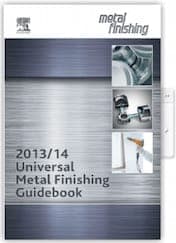
-----
Safety issues with hobby electroplating
Some electroplating is safe and easy: we even offer instructions on this site to school children on how to do zinc or copper plating for science projects. But some types of plating are very difficult and quite dangerous. It's a mistake to assume that "parts is parts" or "plating is plating". Please read on ...(affil links)

free pdf is currently available from academia.edu
Q. I am a serious business minded, environmentally aware person. I have children, pets and a garage. I was very keen and excited after spending the better part of two days (12 actual hours) researching the plating industry. I am also a gear head - auto maniac. I restore cars, trucks on my off time and sometimes on my on time. Everything up to the point that I began reviewing this site was positive. Affordable small business opportunity. To say the least I was excited. Then the brutal "realities" of the industry. I am left confused. Really confused.
The words from the Professional Engineer is basically stating if you move forward be extremely cautious. Why would the manufactures of the small home based systems not be placing the same warnings - if these are truly legitimate concerns. Due diligence is most certainly placed on the shoulders of the manufacturer and/or the middle men in selling me a piece of equipment. I would really appreciate one of these folks writing into this forum. A few words of advice speak to us in a civil manner, do not berate or abuse us with your expertise of this subject. Believe me we all have areas of expertise. This forum should not be designed for a good old PE to get his kicks from kicking a puppy.
Thanks,
Ric S [last name deleted for privacy by Editor]hobbyist - Whitehorse, Yukon, Canada
2003
A. I don't kick puppies, Ric, but some hobbyists claim I'm trying to keep plating to myself to limit competition (don't offer plating services, never did, never will) when I've spent 16 years here building & maintaining 50,000 threads of free publicly-viewable conversation on the subject. I've received abuse myself for suggesting books, or that people attend a free American Electroplaters Society meeting (NASF). Some people have decided they're going to do plating -- and become abusive if asked to look around first.
Plating solutions are not plutonium, this site teaches school kids how to do it, but plating can be a problem that some other hobbies are not for two basic reasons: first, because robust plating can be complex; second, because it can have environmental restrictions that other hobbies aren't burdened with.
Regarding complexity: In his book, "Electrodeposition -- The Materials Science of Coatings and Substrates" [on AbeBooks, or eBay, or Amazon affil links] , by Lawrence Livermore National Laboratories' former head of metals & metal processing, Jack Dini, he writes: "However, it should be noted that electroplating is not a simple dip and dunk process. It is probably one of the most complex unit operations known...", whereas people will read an old J.C. Whitney ad for a $29 plating kit, and simplicity is the impression that registers. While it is easy for grade school children to do copper and zinc plating with kitchen ingredients for a science demo, this is simply world's apart from robustly chrome plating alloy wheels.
Regarding environmental issues USA readers should read 40 CFR 433 and decide for themself what it says (you'll find it on-line). The way I read it, if you offer plating services for sale or plate and sell stuff, you are obligated to hold environmental permits and to comply with reporting requirements. Maybe I'm reading it wrong; ask an EPA hotline for an interpretive ruling, or ask your sewer authority if it's okay to dump your rinsewater down the drain; maybe they'll say it's okay, but I doubt it. Again, a hobby plater is a de minimus problem, but if something goes wrong, the hobby plater might be open to finding himself in trouble if they sell a plating service or plated parts.
We in the plating industry don't consider our trade unduly hazardous or feel that it places an undue load on the environment, Ric. We rail against over-regulation. Rather, it's the federal government that feels that plating offers enough risk of environmental mismanagement that it should be tightly regulated. Electroplating was my nation's first categorically regulated industry, even before there was an EPA. Whether this was based on actual environmental danger vs. picking a good political target is a great question, because it's hard to believe that politicians ever truly believed that a mom & pop low tech plating business posed more danger than the super powerful pharmaceuticals, pesticides, and herbicides produced by their megacorp donors. But in the end, 29 years of categorical regulation plus aggressive environmental prosecution with penitentiary terms for violators sets electroplating apart. Our government has addressed the problem of cut-rate waste disposal companies doing midnight dumping then disappearing this way: the waste is the generator's responsibility forever! No matter how much you spend to responsibly dispose of your waste, it remains YOUR waste forever.
Again, the main issue is NOT that all hobby plating is difficult, dangerous, and potentially environmentally damaging; the main problem is the oversimplification that "plating is plating" (one example is that chrome, brass, or silver plating involve very hazardous chemicals whereas some other plating solutions don't), and that a hobby and a small business are pretty much the same thing (the government doesn't see it that way).
Thanks for writing, and good luck!

Ted Mooney, P.E.
Striving to live Aloha
finishing.com - Pine Beach, New Jersey
Ted is available for instant help
or longer-term assistance.
A. Ric,
I think you have gotten the wrong impression of the purpose of this site. I have been an avid reader and writer for some time. The sole purpose for this site is to provide information and communication of the metal finishing industry. This information is supplied to people of all types: school students, housewives, hobbyists, opportunists and the occasional expert. The fact that you feel you and others are berated, I would bet comes from your confusion and inexperience with the industry & environmental regulations. The fact is many supporters and information suppliers that you find on this site will warn of those regulations. Why, you may ask? Because many have been there and had to deal with or fold under the presiding regulations.
Your observation that the fault lies with the manufacturer of the system, will, frankly, not prove anything to the regulating authorities. And, I would almost bet that the equipment comes with a disclaimer releasing liability. Now, consider this point: if you are caught illegally dumping chemicals, either down the toilet or in your back yard, are you, as an environmentally aware individual, willing to pay the thousands or millions of dollars to clean up the contamination?
My final point is concerned with your second statement. Children and pets should not be exposed to the hazardous chemicals involved with electroplating. Many chemicals can cause burns and irritations, while others cause cancer, mutations, and reproductive damage. A home or garage is not the place for such items. Respect and responsibility needs to be addressed when using chemicals.
I now pose to you, instead of commenting on other posts you have read, please take the time develop some questions that you need answered to make an intelligent decision on this "business opportunity."
Regards,
Ira Donovan, M.S.F.Kansas City, Missouri
A. Excuse me a minute, whilst I locate my soapbox...ahh.. there it is, now I may begin:
Ric,
Ted brought up an excellent point(s), especially about reading 40 CFR (if you have a couple of days to kill, not 12 hours). The responsibility of the waste/hazards is clearly on the end user, NOT the manufacturer of the product. The manufacturer is only responsible for providing an MSDS with any chemical he may supply you. We, here in the coating industry, are familiar with the term "Cradle to Grave", which, in a nutshell means that the end user of a product, or one whom creates the waste is ultimately responsible for any mishap that may happen onsite, or even after the waste has been properly disposed of. The manufacturers of these plating kits are in business to sell a product, and once you pay for it, and it leaves their dock [it's not their concern] what you do with it, or how you manage any waste created by their system.
While I don't spend a lot of time reading the "hobby" section of this forum, the threads I've read appear to give sound advice (based on years of experience), and I've seen very little, if any, "berating, or abusing" going on. Sometimes you should just take it to a professional. Would you want someone rebuilding a transmission on your vehicle that had just spent 12 hours reading a book or surfing the web for advice? Is it really worth saving $50 on trying to re-plate your car emblem at the cost of your eyesight, because you weren't properly trained on safe handling of chemicals? Your notion of "due diligence" is very naive in the plating world, from my experience; you buy the chemicals, you buy the power supplies, the heaters, the chillers, etc, etc, and unless there is a manufacturing defect it's YOUR responsibility to make your product come out the way you want it. There are no guarantees, I've been in this business for almost 16 years..and I learn something new almost everyday. As a plater, you will be asked to coat a part worth 1000s of dollars, for a mere $50 ... and, be held responsible if something goes wrong. The plating industry is losing 1000s of jobs, and 100s of business, to overseas competition, where labor is cheap, and environmental regulations are non-existent. So please, forgive me, if I ask you to take your $100 job to a local professional, to not only protect the environment, and yourself ... but also to get a job well done, based on years of experience ... not 12 hours. The regulations (RCRA, CRCLA, OSHA, etc.) that our industry has to abide by are completely mind boggling (and yes ... sometimes asinine). In my heart I know that there are millions of pounds of waste "improperly" disposed of, each year, by households, and probably quite a few home hobbyists with their lovely little kits that didn't quite produce the results that they wanted. This is NOT to discourage anyone who may be into doing things theirselves, or, perhaps wanting to get into "the business".
But Ric, HERE you will find REAL advice, from people who've been there, learned a lot of hard lessons..and who are not trying to sell you anything (I think you'll find a lot of replies, such as mine, whose company they work for is not a sponsor of this site, we come here to get knowledge, and also to share it). I have no degree...just 16 years of learning from the "School of Hard Knox", and you'll note, that in my picture, there is a puppy, who hasn't been kicked in 12 years (since he chewed up my remote). Now.. what was your question, Ric?

Marc Green
anodizer - Boise, Idaho
!! Okay, okay. I get it. In all honesty I did spend a very limited amount of time on the investigation. From review of this site it is very clear that plating is not a novice sport (business). I thank you for your feedback. I will be researching the industry further in potential hopes of possibly bringing some sort of a plating business to Yukon. The closest plater appears to be in Alberta. Though at the same time we do only have 20,000 people in Whitehorse and 30,000 in all of Yukon and a business case would need to be done.
Thanks again ... hope I did not insult anyone as It was the end of a long day of research when I wrote the comments.
Cheers,
Ric S [last name deleted for privacy by Editor]hobbyist - Whitehorse, Yukon, Canada
2003
Ed. note: Thanks, Ric!
Q, A, or Comment on THIS thread -or- Start a NEW Thread
